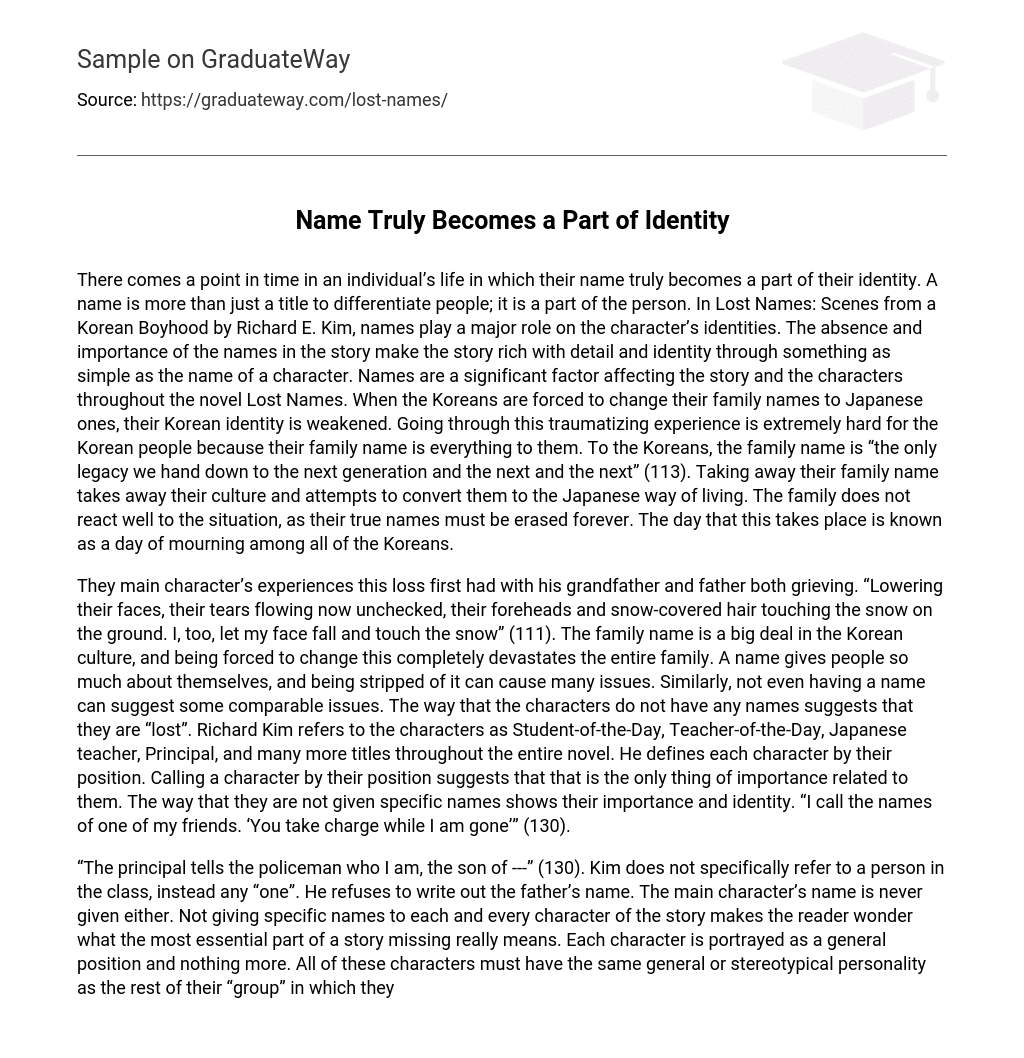In Lost Names: Scenes from a Korean Boyhood by Richard E. Kim, the text emphasizes the significance of names, highlighting that they are more than mere labels and instead form an integral part of a person’s identity. The story delves into how the absence and importance of names contribute to the individuality of characters. When forced to adopt Japanese names, the Koreans undergo a loss of their Korean identity, which proves to be deeply traumatic due to the immense value held by one’s family name. This name represents their legacy, passed down through generations, and stripping them of it is an attempt to erase their culture and assimilate them into Japanese life. Unfavorably, the family reacts negatively as their true names are forever obliterated, turning this day into a day of mourning for all Koreans involved.
The main character experiences the loss of his grandfather and father grieving. They weep with their faces lowered, tears flowing freely, and foreheads and hair covered in snow touching the snowy ground. The loss of the family name devastates the entire family as it holds a significant importance in Korean culture. A name reveals much about a person’s identity, and being stripped of it can lead to numerous issues. Similarly, lacking a name can indicate similar problems. The characters in the novel are without names, rendering them “lost”. Richard Kim refers to them as Student-of-the-Day, Teacher-of-the-Day, Japanese teacher, Principal, and various other titles throughout the book. He identifies each character solely based on their position, implying that their position is their only meaningful attribute. Not being assigned specific names underscores their significance and identity. “I ask one of my friends by name. ‘You take charge while I am gone'”.
“The principal informs the police officer about my identity, as the son of—” (130). Kim does not explicitly mention a specific individual in the class, rather anyone in general. He refuses to disclose his father’s name. The protagonist’s name is also withheld. The absence of specific names for each character raises questions about the missing crucial element in the story. Each character is portrayed as a representative of a broader category and nothing more. They all seem to embody the same general or stereotypical traits associated with their respective “groups” they belong to. A name holds the inherent identity of a character. Alongside these unidentified characters, the book’s title also signifies the significance of names. Lost Names suggests that the names of the characters within the story have been forgotten or erased. It reflects the identity crisis experienced by most characters in the story, including the protagonist’s father and other Korean families living under Japanese rule. The withholding of the protagonist’s name urges readers to contemplate the symbolic meaning of the book’s title; it represents both the lost name and lost identity of the Korean population living under oppression.”
The author’s use of the subtitle Scenes from a Korean Boyhood suggests that he is referring to a boyhood experience, but does not explicitly state that it is his own. This deliberate omission encourages readers to view these characters as representatives of a larger group, highlighting the author’s aim to present a broader perspective on humanity. The main theme conveyed is the infringement upon the rights and culture of the people of Korea, reflecting a similar situation in contemporary America. The National Security Agency (NSA), a federal government agency, surveils many American citizens by accessing their personal information like internet searches, text messages, and phone calls. This constant monitoring raises concerns about whether individuals can truly be themselves when every aspect of their lives is being scrutinized. Both the actions of the NSA and the unjust authority depicted in Lost Names violate the identities of their respective societies, which is an abuse of power that should never be exerted over the population.





